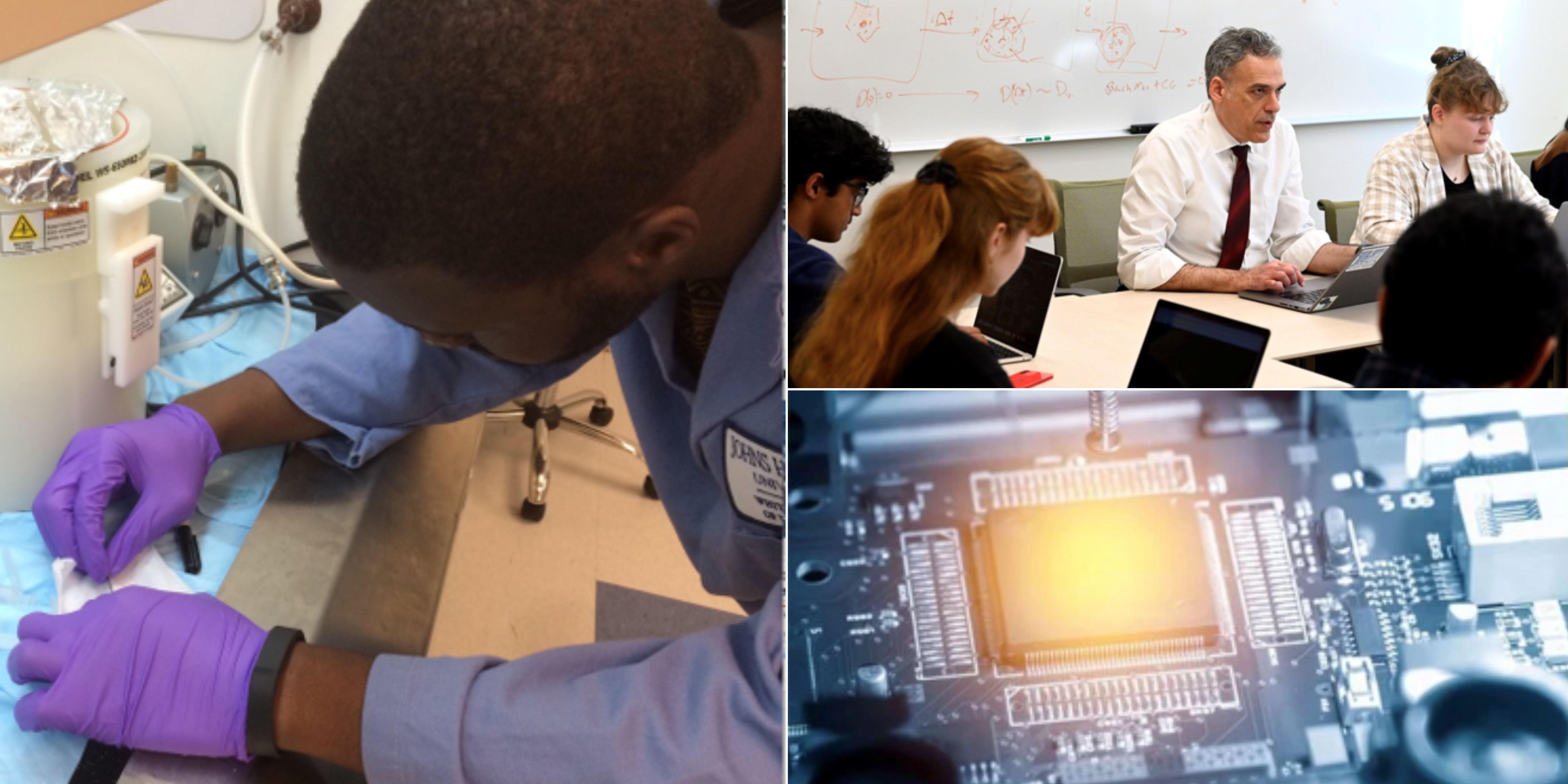Overview
This AI-Driven Advancement in Microelectronics (ADAM) program is a joint program that leverages the strengths of faculty at Morgan State University and Johns Hopkins University and its nearby campuses. ADAM’s goal is to offer a training program that combines research and education in AI and semiconductor materials and devices. Inspired by President Biden’s Chips to Science Act, the program aims to train the workforce of the future in microelectronics.
Coursework for NRT trainees, whether for MSE or PhD students, is designed to ensure that all participants share core knowledge on which to build an AI-driven semiconductor-focused competency. The core curriculum will provide a common base of skills and language to participants. It also provides a strong preparation for their chosen career tracks and to explore amongst career tracks. The coursework will also provide flexibility in areas where students arrive with different levels of preparedness.
Quick Summary of Program Components and Requirements
- Four required, described in more detail below. Three of the four (Core 1-3) are required. Core 4 is a track-specific elective taken from a list of acceptable courses.
- One required internship experience
- Attendance and participation in twice-annual workshops (winter intersession and summer) with embedded track-specific experiences.
- Career guidance and personalized mentoring.
Core Courses
Logistics: All four core courses will leverage the proximity of both campuses (JHU and MSU). The general schedule will be: First half of the semester at JHU, second half at MSU. Classes will occur on the same day(s) of the week with consecutive timeslots to best optimize travel. Maryland Transit authority bus service routes run every 10- 13 minutes for transportation between campuses.
Core 1. JHU 590 495 Microfabrication Laboratory. (Andreou, Wang (JHU) /Spencer (MSU); 3 credits)
This course provides Trainees with practical hands-on experience in the materials realities of microfabrication. The course utilizes the Whitaker Microfabrication Laboratory in Clark Hall for the first half of the semester and the Center for Education and Research in Microelectronics at Morgan State for the second half of the semester. This will provide students the foundational knowledge and practical clean room experience that ranges from wafer to functional device. The content will ensure that Trainees understand the intricate and practical realities of semiconductor processing.
Core 2. New- First offering expected Fall 2025 Foundations of AI/ML for Chemical & Materials Systems. (Osuagwu (MSU)/ Clancy, Hernandez (JHU); 2 credits)
This course provides Trainees with a conceptual and mathematical understanding of “AI/ML” techniques, their taxonomies, the underlying key principles, and how they can be applied to varied research problems. Peer-teaching of some of the course leverages student feedback that this reduces the barrier to students learning. This course ensures a common language and understanding of AI/ML methods. Basic Python skills will be assumed; the self-paced “Software Carpentry” or any introductory Python course can be a pre-requisite, as needed. The course will cover a refresher on linear algebra, probability and statistics, as well as teaching students to understand whether a problem and the ancillary data are suitable for an AI/ML approach. The majority of the course will provide foundational skills in symbolic AI, clustering and regression techniques, genetic algorithms, deep and convolutional neutral net modeling, reinforcement learning, and Bayesian optimization.
Core 3. New- First offering Spring 2025 Strategies for Innovation and Design. (Osuagwu (MSU)/ Sheff (JHU); 1.5 credits)
This course provides Trainees with the skills to critically analyze businesses and apply an engineering-based thought process to more qualitative problems, as well as understand the elements that can make a company or project successful. Understanding business logic and considerations that drive engineering and R&D decision-making are skills that students in most STEM-oriented PhD programs never get the chance to explore.
Core 4. Track-specific electives
Trainees are also expected to complete one elective course specifically focused on an “AI/ML-first” approach to semiconductor materials and devices and tailored to their specific chosen track. Acceptable electives include the following courses:
- Posited new course on materials automation with computer vision and machine learning (Nyarko (MSU) and Taheri (JHU)
- EN 540 440 “Micro/Nanotechnology: The Science and Engineering of Small Structures” (Gracias)
- EN 520 624 “Integrated photonics: from Inverse Design to Hardware Accelerators” (Foster)
- EN 520 670 “Photovoltaics and Energy Devices” (Thon) – topics will be updated to include ML/AI applications in the PV and energy areas
Other electives may be added in future years.
Career-Based Tracks
Student Trainees have the choice of five different career tracks that enable them to focus their training with a specific career in mind. These tracks are intended to prepare the student for their careers in a custom-curated experience.
- Entrepreneurial Track: Trainees will gain a foundational understanding of the business case for new technologies and products and how to develop it, for example, sources of information about markets, customer motivation and how to analyze new technologies for their customer fit.
- Industry Track: Trainees will gain the foundational educational competencies necessary to compete in industrial settings
- Researcher Track (Government Lab/NGO): Trainees will gain key skills to identify funding and collaboration opportunities available to Government Laboratory/NGOs, execute and manage research projects within budget, and prepare communications of technical results particularly to government stakeholders.
- Professorial Track: Trainees in this track will be encouraged to augment their scientific accomplishments and boost their CV by participating in the JHU Teaching Academy, which includes the possibility of earning a certificate of completion.
- Policy/Public Service/Politics (PPP) Track: Trainees in the PPP track will develop skills including negotiation and conflict resolution, coalition building, stakeholder identification and analysis, metrics development and assessment, leading change, regulation development process and policy announcement and promotion process.

